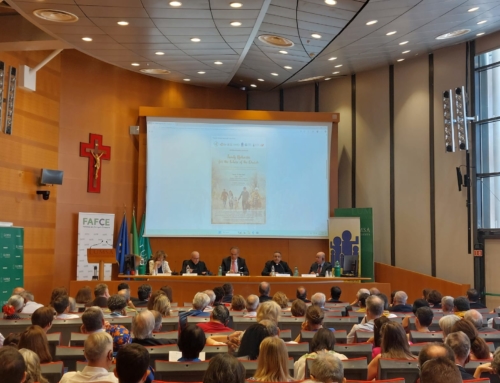Brussels, 3 March 2021
On the European Day for a work-free Sunday, FAFCE recalls the need for a weekly common day of rest, crucial for the social cohesion of our communities and the intergenerational bond within families. FAFCE is therefore happy to join the statement of the European Sunday Alliance (ESA), a network of more than 100 national Sunday Alliances, trade unions, employers’ organisations, civil society organisations, churches and religious communities committed to raise awareness of the unique value of synchronised free time for our European societies.
JOINT STATEMENT OF THE EUROPEAN SUNDAY ALLIANCE ON THE OCCASION OF THE ANNUAL EUROPEAN DAY FOR A WORK-FREE SUNDAY ON MARCH 3 2021
On March 3, 321 AD, emperor Constantine decreed Sunday to be a day of rest protected by law. On the occasion of today’s 1700-year anniversary of a work-free Sunday, the European Sunday Alliance recalls the lasting value of synchronised free time – in most European countries traditionally on Sundays – and the importance of protecting it. On this year’s annual European Day for a Work-Free Sunday, the European Sunday Alliance calls on political leaders in Europe to pay more attention to the value of synchronised free time. This is especially relevant in times where the Covid-19 pandemic has accelerated existing challenges of digitalisation by intensifying work and extending working hours, thus putting a healthy work-life balance at risk for more people.
One of the major impacts of the lockdowns during this disastrous Covid-19 pandemic has been an acceleration of previous trends towards increasing levels of mobile and home working. In particular, with the rise of digital working, the fragmentation and de-limitation of working time has further proceeded. Working in the evenings and during weekends is increasingly common and indeed expected by many employers. This increases stress for workers while it affects their work-life balance; and this compromises the health and wellbeing of workers, making them not only sick in the long run but also causing increasingly more often their absence from work due to psychosocial illness for sustained periods of time.
According to the European Sunday Alliance, a broad network of more than 100 national Sunday alliances, trade unions, employers’ organisations, civil society associations, churches and religious communities in the European Union, a full day of rest per week is indispensable to recover. Indeed a common day of rest truly increases wellbeing and brings a positive effect on health: Only during a common day of rest is it possible to pursue volunteer work, civic engagement, joint social, sports or faith-related activities, family time and, more generally, to spend time together. Humans are social beings, and for many of them their health requires more than individual time off at scattered, random moments of the week to spend alone. The challenges of the pandemic have highlighted the need of human beings for structure in their daily routine. A day recognised by tradition or custom – in most European countries effectively the Sunday – is essential as a day to disconnect, literally and figuratively.
Establishing a European right to disconnect is currently – and rightly so – debated throughout Europe. Work-life balance, as well as healthy, safe and well-adapted work environments, are at the heart of the European Pillar of Social Rights, which all EU institutions and Member States government have committed to implement.
On March 3, the annual European Day for a Work-Free Sunday, the European Sunday Alliance calls on political leaders in Europe to put synchronised free time as a priority on the social policy agenda and help make a tangible, visible and cherished improvement to the lives of citizens across Europe. In particular, the European Sunday Alliance calls on the European Commission to align its upcoming proposal for a directive on a right to disconnect with article 2 of the Council of Europe’s Social Charter which already requires “a weekly rest period which shall, as far as possible, coincide with the day recognised by tradition or custom in the country or region concerned as a day of rest.”
——————–
The European Sunday Alliance (ESA) is a network of more than 100 national Sunday Alliances, trade unions, employers’ organisations, civil society organisations, churches and religious communities committed to raise awareness of the unique value of synchronised free time for our European societies. Contacts to the Steering Group of the European Sunday Alliance.







